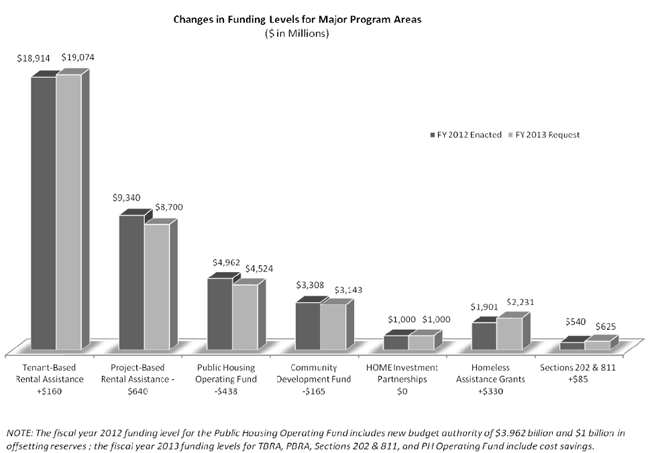The Department of Housing and Urban Development (HUD) unveiled its 2013 budget proposal today, asking Congress for about $44 billion. The amount is roughly the same as the amount Congress authorized for the 2012 budget year.
In addition, HUD is asking for authority to guarantee $400 billion in mortgages through FHA's Mutual Mortgage Insurance Fund which is expected to provide 1.2 million single family mortgages, $149 billion in loan volume, during the year and $500 billion in Ginnie Mae guarantee authority in order to help finance a wide array of government-insured products. In addition it requests $25 billion in loan guarantee authority for the General and Special Risk Insurance Panel which will provide an estimated 156,000 units in multifamily housing properties and 80,600 beds in health care facilities.

Approximately 75 percent of HUD's budget goes to rental assistance including both tenant and project based assistance. Among the tenant based program (TBA) funds requested for the year are:
- $17.238 billion for the renewal of existing Section 8 vouchers, providing affordable housing for more than 2.2 million families in need, including the renewal of special purpose vouchers funded in previous years;
- $1.575 billion for administrative fees associated with operating TBA.
- $111 million for Mainstream Section 811 vouchers to enable persons with disabilities access to affordable, private housing of their choice, and accommodate the provision of supportive services;
- $75 million in Tenant Protection vouchers, which are provided to tenants to replace either public housing that is demolished or sold or projects assisted by Multifamily Housing programs that stop receiving federal subsidies; and
- $75 million for the HUD-Department of Veterans Affairs Supportive Housing (HUD-VASH) vouchers to assist an estimated 10,000 homeless veterans.
Project-based assistance provides funds to state and local Public Housing Authorities to supplement rents and maintain the properties. HUD is requesting $6.59 billion to operate public housing programs and modernize its aging structures. This request includes:
- $4.524 billion in Public Housing Operating Funds to fund more than 3,100 public housing authorities to operate and manage approximately 1.2 million units of publicly owned affordable rental housing units, and
- $2.07 billion in Public Housing Capital Funds, primarily to address capital repair and replacement needs.
HUD's Project-Based Rental Assistance (PBRA) program provides rental assistance funding to privately owned multifamily rental housing projects. The amount of PBRA funding paid to each owner is generally the difference between what a household can afford (up to 30 percent of income) and the HUD-approved rent for the unit. For FY 2013, HUD is requesting a total $8.7 billion in funding for PBRA programs which includes:
- $8.44 billion for the renewal and amendment of existing PBRA contracts; and
- $260 million for Project-Based Contract Administrators to effectively administer the PBRA program.
Another budget item is over $7 billion to fund capital grants toward local housing and community development initiatives. These include:
- $9.95 billion for Community Development Block Grants;
- $2.07 billion for modernization capital grants, administrative receiverships and financial and physical assessment support through Public Housing Capital funds.
- $150 million for the Choice Neighborhood initiative; and
- $60 million for Indian Community Development Block Grants.
Approximately five percent of the HUD budget goes to various initiatives including remediation of lead based paint hazards, housing counseling, fair housing and equal opportunity, family self-sufficiency counselors, and research and data collection. This year HUD is requesting a total of $2.1 billion for these initiatives.
In presenting the budget, HUD Secretary Shaun Donovan said that it includes several proposals to improve the efficiency and effectiveness of department programs.
- It merges its Public Housing Operating and Capital Funds programs into a single subsidy stream.
- Outlines a proposal to streamline and enhance the Family Self-Sufficiency program,
- .Includes a series of reforms to rental assistance programs that save over $500 million without reducing the number of families served;
Donovan said that while the budget is holding the line on increased expenditures, it:
- Maintains housing assistance for all families currently receiving rental subsidies;
- Serves almost 2.5 million families living in public housing and project-based Section 8 developments over 60 percent of whom are elderly and disables;
- Supports tenant-based vouchers for more than 2.2 million families over $45 percent of whom are elderly and disabled;
- Provides 10,000 new vouchers to homeless and funds 5,300 more in supportive housing;
- Enables FHA and Ginnie Mae to continue their crucial, temporary countercyclical roles;
- Brings private capital back to the market through FHA premium increases and other measures;
- Assists nearly 5.5 million households, an increase of 82,000 over fiscal year 2011;
-
Creates
or retains 423,000 jobs directly and 360,000 more indirectly.








